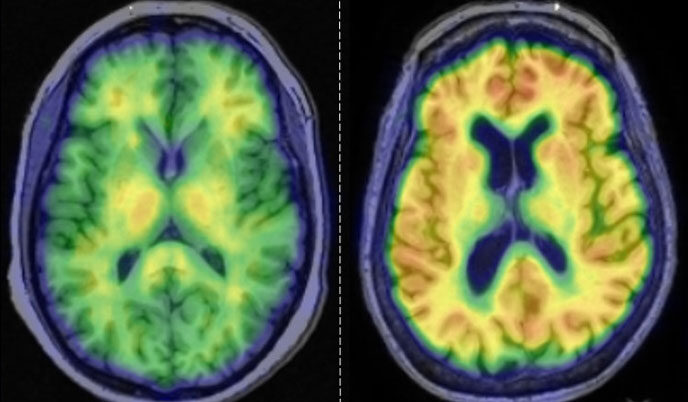
UW shows strong presence at Alzheimer’s Association International Conference
The world’s largest and most prestigious Alzheimer’s disease conference is underway this week, and UW Alzheimer’s disease researchers are attending in high numbers, leading several important discussions.

Groundbreaking phase 3 Alzheimer’s clinical trial at UW in need of volunteers
The University of Wisconsin School of Medicine and Public Health is recruiting volunteers for a study testing an investigational treatment that aims to help prevent the earliest memory loss due to Alzheimer’s disease.

Alzheimer’s study finds link between living in disadvantaged neighborhoods and brain shrinkage, declining brain function
In a newly published study, researchers at the University of Wisconsin School of Medicine and Public Health report finding a correlation between living in neighborhoods with the fewest social and economic advantages and experiencing changes in brain structure and function that are characteristic of Alzheimer’s diseases and related dementias.

UW awarded research funding to identify ways to improve emergency department visits for people with dementia
The University of Wisconsin School of Medicine and Public Health is one of four sites awarded a total of $7.5 million from the National Institutes of Health (NIH) to conduct research that could lead to improved care in emergency departments for people with dementia.

UW–Madison Alzheimer’s researchers well-represented at annual conference
Researchers from the Wisconsin Alzheimer’s Disease Research Center, Wisconsin Alzheimer’s Institute, and the University of Wisconsin School of Medicine and Public Health shared new dementia research at the virtual 2020 Alzheimer’s Association International Conference, July 27 to 31.

Neighborhood disadvantage associated with presence of Alzheimer’s disease-related brain changes at autopsy
People in the most disadvantaged neighborhoods in the United States may face greater odds of developing Alzheimer’s disease-related brain changes, according to researchers at the University of Wisconsin School of Medicine and Public Health.

Exercise linked to enhanced brain function in adults at risk for Alzheimer’s Disease
Regular aerobic exercise may decrease the likelihood of developing Alzheimer’s disease, or slow its progression, in adults who are at a higher risk, according to a new study from the University of Wisconsin School of Medicine and Public Health (UW SMPH).

UW–Madison study finds where you live affects brain health
Living in disadvantaged neighborhoods may impact the brain, according to researchers at the University of Wisconsin School of Medicine and Public Health.

Wisconsin Alzheimer’s Disease Research Center receives $15 million from NIH
The Wisconsin Alzheimer’s Disease Research Center will establish, among other activities, a first-of-its-kind research program into improving the care of Alzheimer’s patients and reducing caregiver stress through a $15 million grant from the National Institutes of Health-National Institute on Aging (NIH-NIA). This grant will provide $3 million annually for five years.

Nathaniel Chin shares the inspiration behind his Alzheimer’s podcast
Every other week, Nathaniel Chin, MD, interviews experts about Alzheimer’s disease research, news and caregiver support for his podcast, Dementia Matters.

Hypertension, obesity escalate memory loss in people at risk for Alzheimer’s disease
A new study from the University of Wisconsin School of Medicine and Public Health shows people at risk for Alzheimer’s disease who have high blood pressure or are overweight experience declines in memory and thinking skills at double the rate compared to those without hypertension or obesity. In this study hypertension in participants was both treated and untreated.

Alzheimer’s study renewal grant to focus on biomarkers of the disease
The Wisconsin Registry for Alzheimer’s Prevention (WRAP) has been awarded a five-year, $19 million renewal grant from the National Institutes of Health to enable in-depth study of molecular hallmarks of the disease in the brain and spinal fluid.